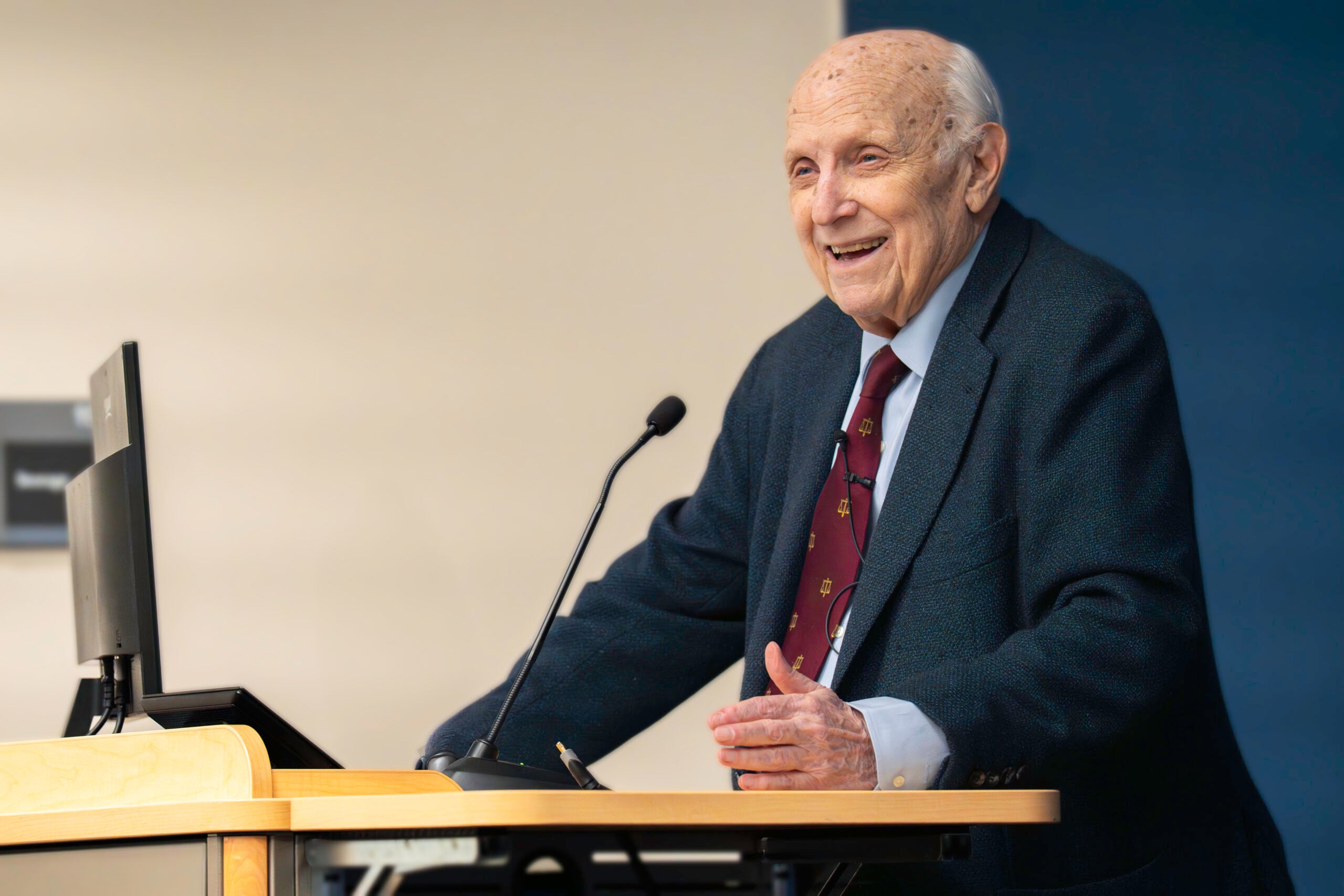KINGSTON, RI — First Amendment lawyer Floyd Abrams spoke to a full audience at the University at the Welcome Center as part of the university’s annual Amanpour Lecture Series, sponsored by journalist and URI alumna Christiane Amanpour. Abrams famously worked on cases such as the Pentagon Papers, Citizens United and Clearview AI, and used the event to reflect on how the First Amendment has shaped American democracy.
“The entire purpose of the Bill of Rights was to limit the power of the government,” Abrams said. “The First Amendment begins with ‘Congress shall make no law,’ and that was deliberate.”
Walking through the history of American free speech, Abrams opened with how the First Amendment came to be, discussing how figures like Thomas Jefferson and James Madison pushed for the Bill of Rights to protect citizens from the government. For example, Jefferson was appalled that the new Constitution did not include explicit limits on government power. Jefferson wrote, “It astonishes me that the new government would not be expressly limited in power.”
Abrams then focused his speech on three key examples on what he argued demonstrated the uniqueness of American free speech protection, beginning with the Pentagon Papers. In 1971, Abrams represented the New York Times in this landmark case, which he described as “the purest test of press freedom in American history.”
The case came to be when the New York Times obtained a secret 7,000 page Defense Department study detailing U.S. involvement in Vietnam. The Nixon administration sought to block its publication, arguing that disclosure would threaten national security. Abrams, then part of the Time’s legal team, helped defend the paper’s right to publish.
“Every page was stamped ‘Top Secret,’” Abrams said. “The government insisted that releasing it would endanger lives. But the real danger was to truth itself, the public’s right to know what its leaders were doing.”
The case traveled through three courts in ten days. In a 6-3 decision, the Supreme Court sided with the Times, ruling that the government had not met the heavy burden required to justify prior restraint.
“Looking back, it was the court’s willingness, even in wartime, to say no, to refuse to silence the press,” Abrams said. “That remains unparalleled. I’ve spoken with lawyers across Europe and Israel, none believe their courts would have ruled as ours did.”
The 1941 Supreme Court case involving the Los Angeles Times was a lesser-known case, but still an equally telling example of Abrams mission statement. The paper published an editorial piece titled “Probation for Gorillas?,” criticizing a judge who was considering leniency for dockworkers convicted of violent union clashes. The article argued it would be a grave mistake to release them. This stance would have been grounds for criminal contempt in England for attempting to influence an ongoing case.
The U.S. Supreme Court, however, ruled 5-4 in favor of the Times, holding that public discussion was protected speech under the First Amendment. Overall, it was a controversial decision, but it established that in America, the right of the press to speak on public issues outweighs the risk of judicial discomfort.
Abrams’ last case examined “the right to be forgotten,” a movement in Europe that grants individuals the opportunity to remove links to their past crimes from Google search engines that are no longer considered newsworthy. A man caused a fatal car accident years ago in Belgium, and after serving his time, he wanted Google to remove the only article that still defined him.
The European Court of Justice sided with him, establishing a precedent that allows such content to be removed. While this can protect privacy, however, it also threatens press freedom and the integrity of recordkeeping.
“This issue forces us to decide,” Abrams said. “ Do we value truth or comfort? The First Amendment’s answer has always been clear.”
Abrams closed by comparing the First Amendment with free speech provisions in other nations’ constitutions and urged students and journalists to remember that true free speech is not self-sustaining — it must be continually defended.
“It’s not the text that matters,” Abrams said. “It’s the courage of courts, citizens, and journalists to live by it.”
By Erin Malinn, journalism, class of 2028

